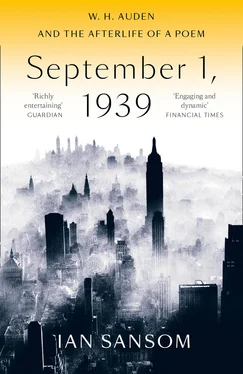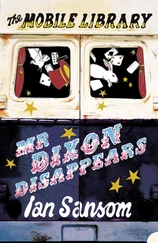*
Other things I have come to realise, in passing, as I have been trying to write a book about W. H. Auden, over the course of the past twenty-five years:
Despite what you may have heard, one’s talents do not necessarily grow and develop over time. One’s character does not necessarily blossom. Things do not necessarily work out. The unique gift that you might have thought you had to offer the world does not necessarily become apparent to you or to anyone else. There is not just the possibility of loss and waste and failure: failure and waste and loss are inevitable. (William Empson, in that wonderful remark about Gray’s ‘Elegy’, in Some Versions of Pastoral – my absolute favourite among all of Empson’s wonderful remarks: ‘And yet what is said is one of the permanent truths; it is only in degree that any improvement of society could prevent wastage of human powers; the waste even in a fortunate life, the isolation even of a life rich in intimacy, cannot but be felt deeply, and is the central feeling of tragedy.’)
There are many individuals whose natural talents far exceed your own.
There are many individuals whose natural talents may seem far less than your own and yet who will inevitably succeed far beyond your own small successes.
There will always be something, someone, some circumstance pushing you to the side of your life, something obscuring the view, something preventing you from doing what you thought you might do or being who you thought you might be. For me, that something, that someone, was Auden: for me, Auden was the problem as well as the solution. Perhaps this is always the case with the people who really matter: wives, husbands, lovers, friends.
*
So what is the final justification for this book, which has taken so long, for so little apparent reason, and which obviously amounts to so little – 70,000 words, give or take, expended in trying to explain Auden’s 99-line poem?
*
I can’t really claim, as is now often claimed by those attempting to write about their relationship to other – often, conveniently, dead – writers, that this is a record of a ‘relationship’. If it is a relationship, it is clearly a very odd sort of relationship, since I never met Auden and realistically never would have met Auden, and if I had done, it seems doubtful we would have got on. He could never have been, for me, as he was for the poet John Hollander, and for many others, ‘Like a clever young uncle’ or ‘like a wise old aunt’: I am not someone blessed with such uncles or such aunts. My actual uncle Dave was a minicab driver; my auntie worked at Yardley’s. There have been, for me, no mentors: there has been no extending of the hand, no leg-up, no hand-me-downs. (In Ulysses , Mr Deasy asks Stephen what an Englishman is proud of – ‘I will tell you, he said solemnly, what is his proudest boast, I paid my way … I paid my way. I never borrowed a shilling in my life. Can you feel that? I owe nothing? Can you?’ It’s true.) But then, in fairness, I was never really protégé material. My relationship with Auden – had there been anything like a relationship – would have been at best a very vague acquaintanceship, a relationship from a great distance, a one-sided sort of relationship, not so much teacher-to-pupil or guru-to-disciple, as master to his valet.
I am beginning to lose patience
With my personal relations:
They are not deep
And they are not cheap.
(Auden, ‘Case Histories’)
This book does not therefore record my ‘relationship’ with Auden – I have no relationship with Auden in any meaningful sense – so much as my relationship with language, or my relationship with language through Auden. Auden as the OED , as Roget’s , as Brewer’s , Fowler’s , Webster’s , the Encyclopaedia Britannica , and P artridge’s Usage and Abusage and Dictionary of Slang and Unconventional English – all of them, combined.
*
(‘Is it one of those How So-and-So Changed My Life type of books?’ asks a friend. ‘No,’ I say. ‘That’s a shame,’ they say. ‘People really like those sorts of books.’ ‘It’s more about my relationship with language, and literature, and ideas,’ I say. ‘Hmm,’ says my friend. ‘Well, good luck with that.’)
*
One of Auden’s great ambitions was to be included in the OED – ‘that inestimable successor to Holy Writ’, as the critic I. A. Richards called it – with his words and phrases listed as coinages and exemplars. It was an ambition he fulfilled many times over, being credited with more than 100 significant usages, including the phrase ‘Age of Anxiety’ (defined, in the second edition of the OED , as ‘the title of W. H. Auden’s poem applied as a catch-phrase to any period characterized by anxiety or danger’), the adjective ‘entropic’, and the noun ‘agent’ (abbreviated from ‘secret agent’). According to the biographer Humphrey Carpenter, describing Auden’s study in his house in Kirchstetten, ‘The most prominent object in the workroom was a set of the Oxford English Dictionary , missing one volume, which was downstairs, Auden invariably using it as a cushion to sit on when at table – as if (a friend observed) he was a child not quite big enough for the nursery furniture.’
*
(The missing volume – Auden’s hardback dictionary cushion – was, according to Carpenter, volume X of the OED : (Sole–Sz). Which might provide a nice alternative title for this book, would it not? Sole–Sz , a title which offers an obvious homophonic pun on ‘sole’ and which also usefully alludes to Roland Barthes’ S/Z , that impossibly complicated book about Balzac’s story ‘Sarrasine’, which was once required reading on every grad course in literary theory, with its typologies of interacting SEM codes and SYM codes, and REF, and ACT and HER codes, and which therefore might suggest that this book too is a work of great theoretical sophistication. Maybe not.)
*
So, not a book about my relationship with Auden. A book about my relationship with language.
*
But we all know – we don’t have to be a Roland Barthes to know – that there can be no simple explanation in language of our relationship with language. It’s like using a mirror to look at a mirror. Words are insufficient to do justice to words, let alone to everything else.
So the enterprise is doomed again.
*
This is all entirely obvious, I suppose, to most people. And barely needs stating.
All I can safely say, then, is that it has taken me twenty-five years to work out the entirely obvious.
And these are my notes.
In literature, as in life, affectation, passionately adopted and loyally persevered in, is one of the chief forms of self-discipline by which mankind has raised itself by its own bootstraps.
(Auden, ‘Writing’)
The reason (artistic) I left England […] was precisely to stop me writing poems like ‘September 1, 1939’, the most dishonest poem I have ever written.
(Auden, letter to Naomi Mitchison, 1 April 1967)
‘September 1, 1939’.
If you know anything about the poem – and you may well know more about it than I do, in which case I should warn you, this is probably not the book for you, it’s a book for my friends and my cousins, for everyone who has ever said to me, ‘W. H. Who? September the What?’ – you will know that it was a poem that over the course of his lifetime Auden variously revised and then disowned. It is a poem with a long and troubled history. It is a poem that has undergone a lot of changes. Perhaps that’s part of its appeal: it is a poem with another life, an afterlife. It is a poem, like a person, that comes with a lot of baggage.
Читать дальше












